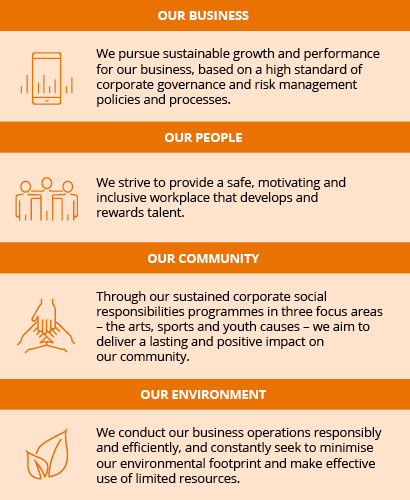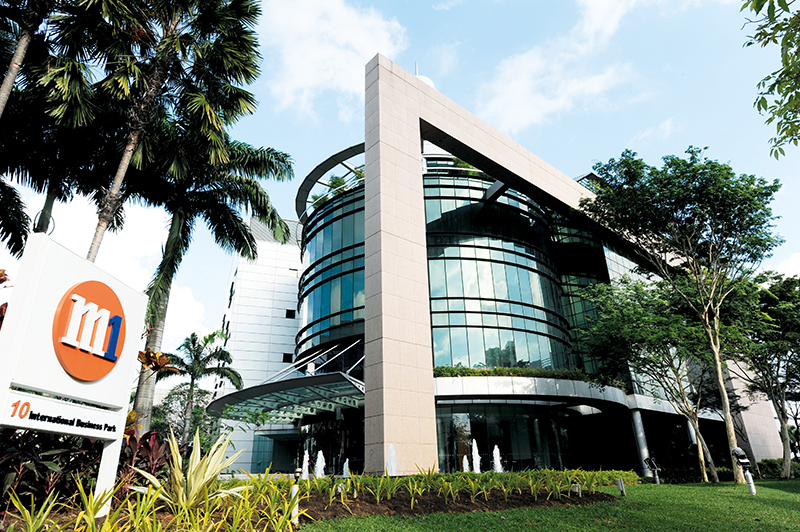M1’s sustainability goals are to create value for our stakeholders, make a positive impact on our community and minimise our environmental footprint
key stakeholders engaged
material topics identified
We are committed to behaving responsibly and ethically in all our endeavours; tackling the challenges of sustainability to create enduring value and meet the expectations of all our stakeholders, both now and into the future.
In this sustainability report, the Company’s seventh, we present the economic, environmental, social and corporate governance performance of our operations in Singapore during 2017. Our achievements, progress and targets for the reporting year are detailed in four sections, each representing a key area of focus for our operations, namely: Our Business, Our People, Our Community and Our Environment.

We welcome feedback on this report, any aspect of our sustainability performance and possible areas of improvement at corpcomms@m1.com.sg
REPORTING SCOPE AND BOUNDARIES (GRI 102-54, 102-12, 102-56)
This M1 sustainability report has been prepared in accordance with the Global Reporting Initiative’s (GRI) Standards1: Core option, and is limited to operations under our direct control for the period 1 January to 31 December 2017. The GRI content index and the relevant references are provided on pages 109 to 112 of the report. To ensure comparability, we have used internationally-accepted measurement units and conversion factors for the reporting of performance data and indicators.
We regularly review our sustainability performance, monitoring and reporting processes, as well as new developments in sustainability reporting, to ensure ongoing improvement. This report has been updated to incorporate changes to Singapore Exchange’s sustainability reporting guidelines and the latest GRI Standards. We have sought assistance from a sustainability consultancy to ensure that alignment between the report content and the requirements of these two frameworks has been respected.
The content of this report has not been externally assured by any independent party.
SUSTAINABILITY MANAGEMENT WITHIN M1 (GRI 102-18)
The evaluation of M1’s economic, environmental and social performance is carried out at top management level by our Chief Operating Officer, supported by the heads of our key departments. Engagement approaches with our stakeholders, material topics and relevant mitigation measures are discussed and prioritised based on expectations and best practices within the current local and global sustainability contexts, but also on the risks and opportunities relevant to M1’s business operations. M1’s management approaches and performance data are regularly re-assessed according to defined targets and adapted if necessary.
Key outcomes, performance updates and proposed changes in our sustainability framework are presented to the Board of Directors for their approval and input. The Board also has oversight of M1’s sustainability reporting agenda.
STAKEHOLDER ENGAGEMENT AND MATERIALITY (GRI 102-42)
We have identified eight stakeholder groups whose engagement with M1 is key to our sustainability efforts. We have strengthened existing engagement channels and created new ones to understand the expectations of each stakeholder group and identify the topics that are material to them.

| 1 | We have chosen GRI Standards (2016) as this is the latest version of the most widely used global and independent sustainability reporting framework. |
M1 STAKEHOLDER GROUPS (GRI 102-40, 102-43, 102-44, 102-46)
| Stakeholder | Main engagement channels | Stakeholder’s expectations |
| Consumer and corporate customers |
|
|
| Institutional and retail investors |
|
|
| Business partners and suppliers |
|
|
| Employees |
|
|
| Regulators |
|
|
| Analysts and the media |
|
|
| Trade associations |
|
|
| Non-governmental organisations and community partners |
|
|
The following table summarises the key material sustainability topics for M1, as determined through our stakeholder engagement channels and management discussion. The table identifies which stakeholder group is impacted by each topic, explains why it is important and outlines our management approach for each topic, as well as summarises our progress during the reporting period and identifies our targets for 2018.
In addition to the material topics highlighted in the table, there may be other important sustainability related topics, such as impact on biodiversity. This report does not include information and performance data on these topics, as they are not material to our business, due to our operating environment or the nature of our business.
| 2 | Contact Centre Association of Singapore, National Trade Union Congress, Singapore Internet Exchange, and Singapore National Employer Federation. |
M1 KEY MATERIAL TOPICS (GRI 102-47)
| Why the Topic is Material | M1’s Management Approach | 2017 Achievements | 2018 Targets |
|
OUR BUSINESS
|
|||
| Governance, ethics and integrity | Impacted stakeholders: All | ||
Maintaining a high standard of corporate governance, in the economic, social and environmental aspects of our business, is key to protecting the interests of all our stakeholder groups. This includes seeking feedback from and communicating transparently with all parties |
|
|
|
| Responsible procurement | Impacted stakeholders: Business partners and suppliers | ||
Adopting a responsible procurement policy helps M1 to indoctrinate among its suppliers the same stringent sustainability principles and corporate values that it adheres to itself |
|
|
|
| Data privacy | Impacted stakeholders: Consumers and corporate customers | ||
Given our role as a provider of mobile and fixed communications services, and being fully aware of the sensitivities that customers rightly have concerning data privacy, protecting that privacy is M1’s prime material topic |
|
|
|
| Transparency in customer communications | Impacted stakeholders: Consumers and corporate customers, regulators | ||
Being fully transparent in all forms of customer communications, builds trust and strengthens our engagement with our customers and other stakeholder groups |
|
|
|
| Customer satisfaction | Impacted stakeholders: Consumers and corporate customers | ||
Customer satisfaction impacts all stakeholder groups either directly or indirectly. Satisfied customers are more likely to be loyal customers who become ambassadors for the brand and build economic growth, which, in turn, leads to a better stakeholder experience for employees, investors and suppliers |
|
|
|
| Public safety | Impacted stakeholders: Consumers and corporate customers, regulators | ||
Having a strong public safety record, particularly in the sensitive area of radio frequency (RF) radiation levels, builds confidence and support for M1 among our customer base and industry regulators |
|
|
|
|
OUR PEOPLE
|
|||
| Attracting and retaining talent | Impacted stakeholders: Employees | ||
Our people form an important stakeholder segment and are a critical component to our long- term success |
|
|
|
| Training and education | Impacted stakeholders: Employees | ||
Investment in the training and education of our people gives M1 an edge in our ever-changing and highly competitive industry. By supporting their personal development, we are enabling our people to reach their full potential |
|
|
|
| Workplace health & safety | Impacted stakeholders: Employees, business partners and suppliers | ||
Providing a safe and healthy workplace protects all stakeholders who carry out their professional responsibilities on M1 sites and strengthens our engagement with those same stakeholders |
|
|
|
|
OUR COMMUNITY
|
|||
| Supporting the community | Impacted stakeholders: Non-governmental organisations and community partners, employees | ||
We believe that for a company to be successful in the long term, it should help create value for the community within which it operates. Participation in CSR programmes is a significant motivation factor for our employees |
|
|
|
| Digital inclusion | Impacted stakeholders: Non-governmental organisations and community partners, regulators | ||
As connectivity becomes an ever greater part of our lives, it is important to ensure that digital services are made accessible to all members of our society |
|
|
|
|
OUR ENVIRONMENT
|
|||
| Energy usage | Impacted stakeholders: All | ||
In line with the Singapore Government’s 2015 pledge that the country will become more efficient in its economic activity by the year 2030, a reduction in the use of non-renewable energy sources is a priority for M1 |
|
|
|
| Carbon footprint | Impacted stakeholders: All | ||
It is essential to prevent our current actions on the climate from compromising the life of future generations. The Singapore Government’s 2030 targets towards the global fight against climate change also highlight the need for companies to reduce their carbon footprint and look towards renewable energy sources |
|
|
|
| Water usage | Impacted stakeholders: All | ||
The supply of fresh water in Singapore is limited. Maximising opportunity to replace fresh water with reclaimed water is an important step towards environmental sustainability |
|
|
|
| 3 | Customer Satisfaction Survey across our customer touch points (Hotline, Customer Service Centres and Retail Shops). |



